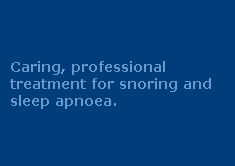Stopping Breathing While Asleep
Stopping breathing while asleep is typically a symptom of a medical condition known as sleep apnoea.
There are two basic forms of sleep apnoea. 'Obstructive' sleep apnoea (OSA) stops people breathing in their sleep as a result of collapsed soft tissue. (I.e., the tongue, soft palate, uvula and pharyngeal walls relax and collapse over the airway.) This is the most common form of sleep apnoea.
Obstructive sleep apnoea is classified according to the number of times the sufferer stops breathing while asleep. A 'mild' sleep apnoea sufferer stops breathing in their sleep 5 to 15 times per hour. A 'moderate' sleep apnoea sufferer stops breathing in their sleep 15 to 30 times per hour. And a 'severe' sleep apnoea sufferer stops breathing in their sleep 30 or more times per hour. In particularly severe cases, patients stop breathing while asleep up to 100 times per hour, with each stoppage lasting a minimum of 10 seconds. More typically, obstructive sleep apnoea sufferers stop breathing for 20 to 40 seconds at a time, although stoppages of up to 2 minutes have been recorded.
The other form of sleep apnoea is 'central' sleep apnoea. This is a neurological rather than physical condition, where the body simply fails to send the neurological signal to breathe.
In either case, sleep apnoea is often undiagnosed because the patient is asleep when they stop breathing. In most cases, they wake feeling unrefreshed and sleepy through the day - which is a simple indicator that the quality of their sleep is not as it should be. By rights, we should feel most refreshed immediately after we've woken.
Both obstructive and central sleep apnoea are serious medical conditions with a wide range of consequences and co-morbidities, including ischemic heart disease, type 2 diabetes, metabolic retardation and consequent obesity, acid reflux, chronic fatigue, excessive daytime sleepiness, loss of libido and impotence ... and much more.
Diagnosis of sleep apnoea is made via a polysomnogram (diagnostic sleep study) which the patient wears over night. The diagnostic sleep study records breathing patterns and stoppages, blood oxygen levels, heart activity, brain activity, limb movement, sleeping position and more. The recorded data is then used by a specialist sleep physician who will determine the nature and severity of the condition and presribe an appropriate form of treatment.
Diagnostic sleep studies can be performed in a hospital-based sleep lab facility, or with portable diagnostic technology in the patient' own home. Most of the cost of the home based study is covered by Medicare.
If you stop breathing while asleep or know someone who does, arrange a diagnostic sleep study by calling 1300 246 637 or completing the form below.

